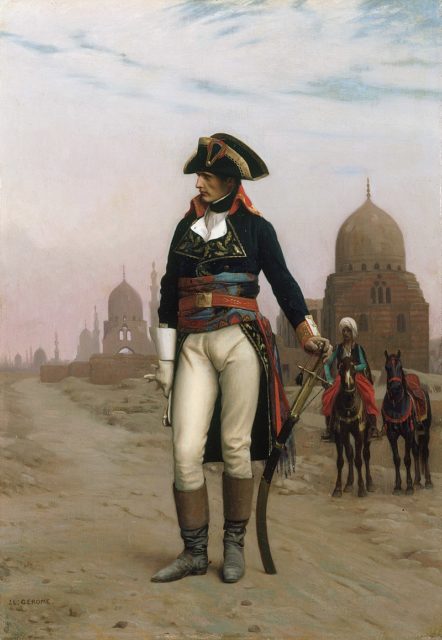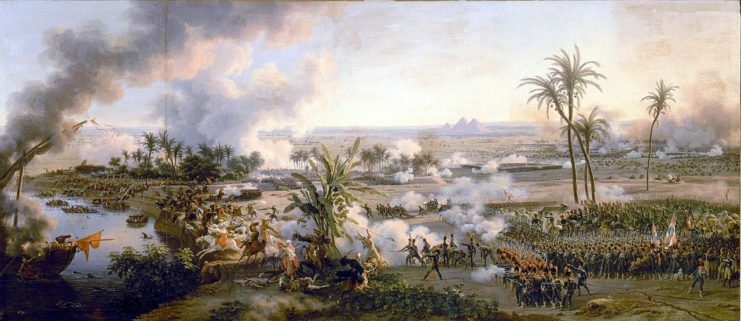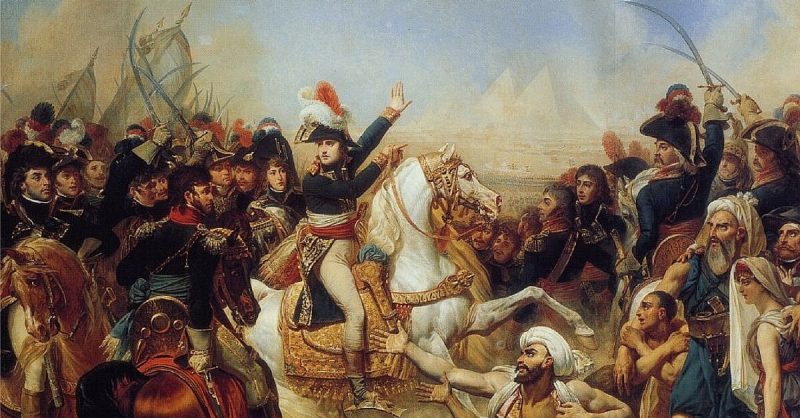The Egyptian campaign Napoleon led in 1798 was one of the greatest disasters of his career. After his fleet was destroyed by Nelson at the Battle of the Nile, the French army was left isolated, with the whole of the Mediterranean between them and home. Despite some successes on land, they were forced into a retreat by the British army. Napoleon abandoned his own men and headed for France, where he would take control of the country.
Yet this was a campaign initially full of promise, in which Napoleon hoped to achieve a range of grand goals.
1. Dividing the British Empire
Among the most important aims was undermining the connections between the parts of the British Empire. The British held huge possessions in India, and these were important to Britain’s economy as well as its status in the world. Control of the Middle East would allow the French to block British access to India through that region, making both trade and political control much harder.
Napoleon’s ambition went beyond even this. Once established in the Middle East, it would be easier to link up with the Marathas and Tipu Sahib, Indian opponents of the British Empire. If all went well, he could not only cut off Britain’s most important colonial possession but sow the seeds to remove it from the British Empire entirely.
2. Trade with the East

There was more at stake economically than just undermining British trade. By seizing Egypt, Napoleon hoped to provide a great boost to France’s economy. Ailing government finances had been one of the causes of the French Revolution, and economic woes had contributed to the many changes of government over the decade that followed. Improving France’s financial fortunes would mean more resources for the army and a more stable nation at home.
Egypt’s location and geography created huge economic potential. It lay at the eastern end of the Mediterranean, where trade from east and west met. Transport by sea was far faster and cheaper than over land, and unless merchants wanted to sail all the way around Africa, Egypt was their least land-based route from east to west, sailing up the Red Sea before moving goods overland to the Mediterranean.
This trade with the east was increasingly important to the great powers of Europe. Luxuries and raw materials flowed from the growing colonies and foreign markets of India and East Asia. Controlling trade with the east meant boosting the fortunes of your nation’s merchants while making a healthy profit in taxes. The French had lost their valuable sugar production to revolts in the Americas, and the British Royal Navy presented a threat to all their Atlantic shipping. If they could reach the east then they could set up new colonies to fill the financial gap.
Napoleon’s scheme was not limited to merely taking land as it was. He wanted to establish a canal at Suez between the Red Sea and the Mediterranean. By making trade across that gap easier, he would further build French profits.
3. Taking Jerusalem
Though the campaign began in Egypt, Napoleon’s ambition lay far beyond there. He aimed to move on into the rest of the Middle East, establishing French power across that part of the world. He was nothing if not ambitious.
Napoleon was a religious pragmatist. In post-revolutionary France, the church’s image was tarnished and too strong an adherence to it could hold a man back. But the majority of those living in France and her growing empire were still Christians, whose faith Napoleon used in building his support base. To them, Jerusalem was an important symbol. As he wrote to a comrade, “re-establishing the Holy City… will be one of those events, which will change the appearance of the world”. The conquest of Jerusalem was therefore part of his plan, as it had been for so many Christian armies over the preceding thousand years.
4. A Quest for Knowledge

Academic learning was on the rise in Europe at the end of the 18th century. The Enlightenment had seen a huge growth in scientific and historical understanding, built in large part upon the unearthed remains of the past. Napoleon valued knowledge, and he valued the prestige that academic achievement could give France. So the expedition he prepared for Egypt was not just a military one – it was also a hive of scholarship.
167 scientists and scholars accompanied the expedition, from mathematician Gaspard Monge to botanist Alire Raffeneau-Delile. They were to provide support to the army, particularly in planning and building the Suez Canal. But they were also to learn more about Egypt, its culture, its geography and its past.
This was the one area in which the expedition can be considered a success, though not so much for the French. In July 1799, Pierre-François-Xavier Bouchard, a military engineer, discovered the Rosetta Stone, an artefact that, decades later, would unlock the secrets of Egyptian hieroglyphics and with them vast knowledge of the ancient past. Many other items were also collected, sketches made and notes taken of Egypt’s fabulous monuments and ruins. These finds would spark the birth of European Egyptology, creating a fascination with and intense study of this ancient culture.
But these finds would not go to France. Though works were written by the expedition’s scholars, most of the artefacts were seized by the British, ending up in the British Museum.
5. Imperial Grandeur
One aim was clearly in Napoleon’s mind, yet less clearly stated in persuading others to support the expedition. This was his chance to gain glory by following in the imperial footsteps of Alexander the Great. Success would give him huge power and prestige.
In the end, failure proved no impediment. It was after his return from Egypt, his reputation not yet tarnished by knowledge of his failure, that he seized control France.
